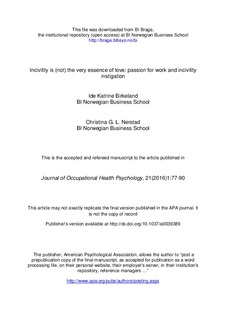| dc.contributor.author | Birkeland, Ide Katrine | |
| dc.contributor.author | Nerstad, Christina G. L. | |
| dc.date.accessioned | 2016-02-09T10:07:43Z | |
| dc.date.available | 2016-02-09T10:07:43Z | |
| dc.date.issued | 2016 | |
| dc.identifier.citation | Journal of Occupational Health Psychology, 21(2016)1:77-90 | nb_NO |
| dc.identifier.issn | 1076-8998 | |
| dc.identifier.issn | 1939-1307 | |
| dc.identifier.uri | http://hdl.handle.net/11250/2378620 | |
| dc.description | This is the accepted and refereed manuscript to the article. This article may not exactly replicate the final version published in the APA journal. It is not the copy of record | nb_NO |
| dc.description.abstract | This study explored the relationship between obsessive passion for work and incivility instigations, as well as the moderating role of a mastery motivational climate. A longitudinal, three-wave study was conducted among 1,263 employees from a large Norwegian workers’ union across a 10-month time span. The results show that obsessive passion for work relates positively to incivility instigations and that this relationship is stable over time. Building on the person–environment fit perspective, we find that the relationship between obsessive passion for work and incivility instigations is stronger for employees with both high levels of obsessive passion and high perceptions of a mastery climate. Our results underline the importance of considering not only the individual in his/her context, but also of considering the match between the individual’s values and the contextual values. | nb_NO |
| dc.language.iso | eng | nb_NO |
| dc.publisher | American Psychological Association | nb_NO |
| dc.title | Incivility is (not) the very essence of love: passion for work and incivility instigation | nb_NO |
| dc.type | Journal article | nb_NO |
| dc.type | Peer reviewed | nb_NO |
| dc.source.journal | Journal of Occupational Health Psychology | nb_NO |
| dc.identifier.doi | 10.1037/a0039389 | |
| dc.description.localcode | 2, Forfatterversjon | nb_NO |
